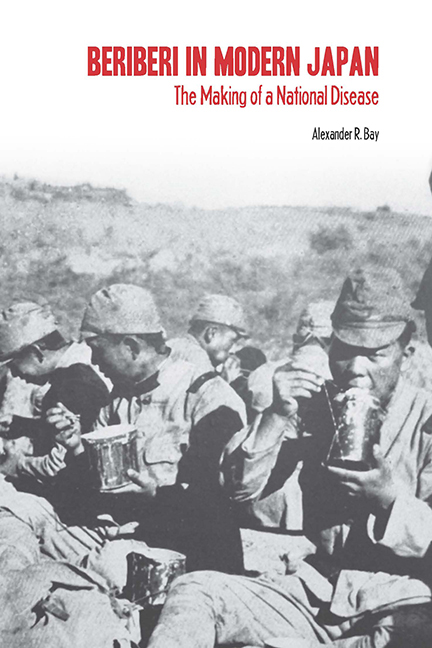Book contents
- Frontmatter
- Dedication
- Contents
- List of Illustrations
- Acknowledgments
- Introduction: Medicine, Power, and the Rhetoric of Empire
- 1 The Geography of Affliction: Beriberi in Edo and Tokyo
- 2 Putting the Laboratory at the Center
- 3 Beriberi: Disease of Imperial Culture
- 4 Empire and the Making of a National Disease
- 5 The Science of Vitamins and the Construction of Ignorance
- 6 The Rice Germ Debate: Total Mobilization and the Science of Vitamins in the 1930s
- Conclusion
- Notes
- Bibliography
- Index
3 - Beriberi: Disease of Imperial Culture
Published online by Cambridge University Press: 08 April 2017
- Frontmatter
- Dedication
- Contents
- List of Illustrations
- Acknowledgments
- Introduction: Medicine, Power, and the Rhetoric of Empire
- 1 The Geography of Affliction: Beriberi in Edo and Tokyo
- 2 Putting the Laboratory at the Center
- 3 Beriberi: Disease of Imperial Culture
- 4 Empire and the Making of a National Disease
- 5 The Science of Vitamins and the Construction of Ignorance
- 6 The Rice Germ Debate: Total Mobilization and the Science of Vitamins in the 1930s
- Conclusion
- Notes
- Bibliography
- Index
Summary
In a 1905 memoir, Surgeon General Ishiguro Tadanori recounts a visit to the famous traditional medicine doctor Tōta Chōan at his home, where he found ten army noncommissioned officers undergoing treatment for their beriberi. Shocked, and no doubt embarrassed, since the army's official stance barred kanpō, he immediately ordered them back to their barracks. Because the army minister Yamagata Aritomo thought highly of Western science, and believed the medical corps chiefs about beriberi, Ishiguro presumed that they had quashed the kanpō theory and the army was therefore free of Oriental medicine. “This was not the case,” he wrote; “kanpō was still very much embedded in the army.”
The military maintained some of the most advanced Western hygiene standards in Japan in the 1890s, yet kanpō was still a large part of medical culture in Japanese society and in the army. As I argued in chapter 2, this was a period of medical pluralism, when indigenous and Western systems of medicine coexisted. It was also a time of nascent imperialism, and pluralistic medicine played an important role during the Sino-Japanese (1894–95) and Russo-Japanese (1904–5) Wars.
Japan and the Qing dynasty had agreed in the 1885 Convention of Tientsin to eliminate any military presence from the Korean Peninsula and inform the other of any intention to send armed support to the Joseon dynasty. During the 1894 Tonghak agrarian uprising, the Korean court requested Qing military support. Japan also deployed land and sea forces, and used the rebellion as a chance to hijack the court, place pro-Japanese reformers in high positions, and attack the retreating Qing troops, thereby initiating the Sino-Japanese War. After defeating the Qing, the Japanese army occupied Taiwan, which became its first colonial holding. Japan also exacted control over the Liaodong Peninsula, gaining the strategic port of Lu Shun (Port Arthur); however, Russia, France, and Germany, through the Triple Intervention, forced Japan to return this portion of the war booty. Russia then signed a long-term lease of the peninsula from China, much to the chagrin of the Meiji government. Russia built up its military strength in Manchuria in the early nineteen hundreds, but diplomatic efforts to ease the situation failed: Japan prepared for war with Russia.
- Type
- Chapter
- Information
- Beriberi in Modern JapanThe Making of a National Disease, pp. 52 - 86Publisher: Boydell & BrewerPrint publication year: 2012



